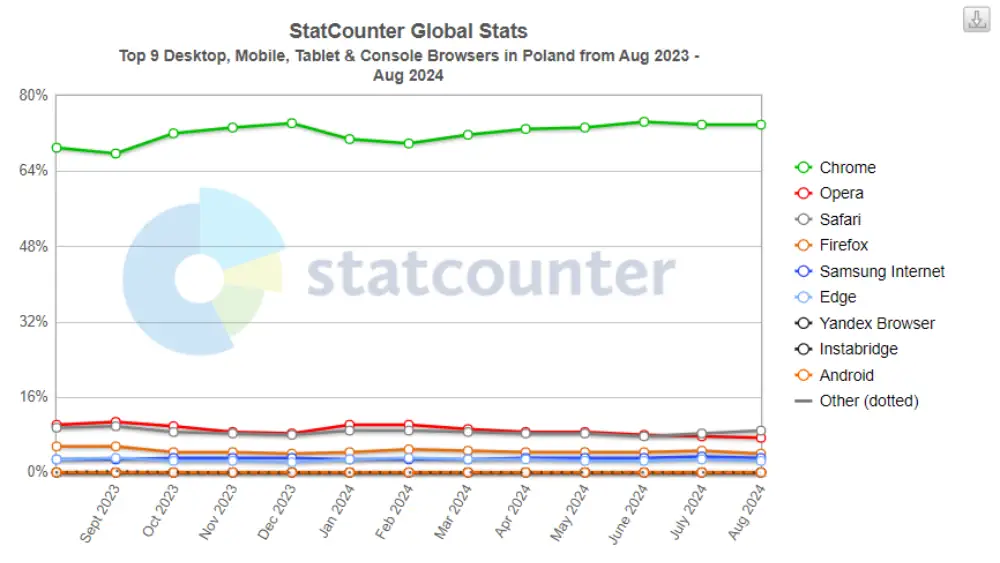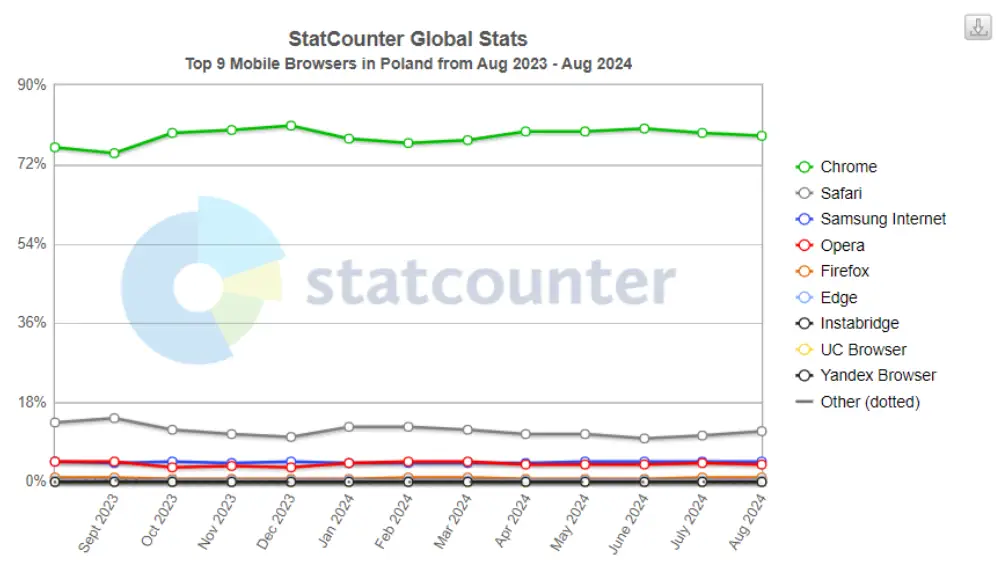 illustration: bing.com/create
illustration: bing.com/createIn the summer of 2024, a historic shift occurred in Poland`s browser market. In July and August, Safari, the default browser on Apple devices, surpassed Opera on all devices for the first time. StatCounter`s data reveals that Safari has been steadily increasing its market share among Polish users, while Opera`s position has been declining.
In January 2024, Opera had an edge over Safari with a market share of 10.18%. However, within a few months, the situation shifted. In May, Safari held 8.13%, while Opera had 8.54%. By summer, Safari ultimately overtook Opera, as confirmed by August data showing Safari at 9.89% and Opera down to 8.41%.
| Month | Chrome | Safari | Opera |
|---|---|---|---|
| 2024-01 | 70.87% | 8.80% | 10.18% |
| 2024-02 | 69.81% | 8.81% | 10.13% |
| 2024-03 | 71.68% | 8.50% | 9.23% |
| 2024-04 | 73.03% | 8.16% | 8.50% |
| 2024-05 | 73.25% | 8.13% | 8.54% |
| 2024-06 | 74.48% | 7.68% | 7.85% |
| 2024-07 | 73.73% | 8.16% | 7.51% |
| 2024-08 | 71.99% | 8.90% | 7.33% |
Why Did Safari Surpass Opera?
The popularity of Safari in Poland is primarily driven by the growing number of Apple device users. StatCounter’s report shows that Apple is gaining market share in smartphones, which directly boosts Safari`s popularity as the default browser on iPhones, iPads, and MacBooks.
Safari owes its market position to several factors:
- Better integration with the Apple ecosystem: iPhone and other Apple device users prefer Safari as it syncs data like bookmarks, passwords, and browsing history across devices.
- Increased trust in Apple: Safari is marketed as a privacy-focused browser. Apple`s strong emphasis on data protection attracts more users to Safari.
- Growing Apple device sales: StatCounter data shows that the rise in Safari users is linked to Apple`s dynamic sales growth in Poland`s mobile and computer sectors in 2024.
Safari, with an 8.80% share in January 2024, reached 8.90% in August. During this time, Opera`s share fell from 10.18% to 7.33%, reflecting a clear downward trend.
Google Chrome: The Unchallenged Leader
Despite shifts between Safari and Opera, Google Chrome remains the unchallenged leader in Poland. Holding a 70.87% share in January 2024 and 71.99% in August, Chrome dominates on both computers and mobile devices.
Why does Chrome continue to reign supreme?
- Universality: Chrome runs on nearly every operating system. Android users have it pre-installed, and it`s also widely chosen on Windows and macOS computers.
- Data synchronization: Like Safari, Chrome offers data synchronization of bookmarks, passwords, and browsing history across devices, making it highly convenient.
- Speed and performance: Google continually invests in Chrome`s development, enhancing its speed and functionality, attracting millions of users.
Data shows that Chrome commands nearly three-quarters of Poland`s browser market, a dominance difficult for competitors to challenge. This highlights Google’s strong position in the industry.
 source: StatCounter Global Stats - Browser Market Share
source: StatCounter Global Stats - Browser Market ShareOpera: A Declining Player
Though Opera has been a strong player in Poland’s browser market for years, its share in 2024 is declining. In January, Opera held a 10.18% share, but by August, this had fallen to 7.33%. This decline can be attributed to several factors.
- Increasing competition from Safari: Users with Apple devices are increasingly choosing Safari over installing additional browsers.
- Saturation of the Android market: Google Chrome dominates on Android devices, and Opera is no longer as popular as it once was. Many users stick with the default browser.
- Lack of significant innovations: Although Opera has introduced features like a built-in VPN and ad blocking, it hasn’t attracted new user groups. StatCounter notes that the lack of major updates in 2024 may explain its decline.
Firefox and Edge: On the Margins
Firefox and Edge remain marginal players in Poland’s browser market. Firefox, once a strong alternative to Chrome, is losing users, especially on mobile devices. In 2024, its share fell to 4.30% in March and didn’t improve through the summer.
Microsoft Edge, despite strong promotion by Microsoft, hasn’t attracted a significant number of users. With a share of less than 3%, Edge remains a niche player in Poland’s browser market.
Mobile Browsers
In 2024, Poland`s mobile browser market was dominated by three main browsers: Google Chrome, Safari, and Samsung Internet. According to StatCounter, Google Chrome reigns supreme, reaching an 80.77% share in December 2023. Pre-installed on most Android devices, Chrome is the natural choice for smartphone users. Its popularity stems from excellent synchronization with other Google devices and intuitive use, appealing to both younger and older users.
 source: StatCounter Global Stats - Browser Market Share
source: StatCounter Global Stats - Browser Market ShareSafari ranks second, mainly due to Apple’s dominance in the premium device segment. In August 2024, Safari held a 13.32% share of the mobile market, though it dropped to 10.25% by December. Apple heavily promotes its browser within the iPhone ecosystem, a strategy evident in Poland, where Apple user numbers are growing. Safari stands out for its optimization on Apple devices and high level of privacy protection, appealing to users concerned about online threats.
Samsung Internet holds the third position, with a 4.44% share in December 2023. Pre-installed on Samsung devices, its market presence is understandable. Although its share is relatively small, Samsung Internet attracts users with privacy features and easy access to popular apps. In 2024, Samsung focused on enhancing its browser, integrating it with AI-driven services, which may boost its popularity in the coming years.
Opera, despite its historical standing, is losing ground in the mobile segment. In December 2023, its share dropped to 3.39%, signaling that users prefer browsers with better integration with operating systems.
COMMERCIAL BREAK
New articles in section Media industry
Tags, hashtags and links in video descriptions. Youtube SEO after Gemini AI update [ANALYSIS]
BARD
Once, positioning a video on Youtube was simple. It was enough to stuff the description with keywords and wait for results. Those days are not coming back. In 2026, the algorithm is no longer a simple search engine that connects dots. It is the powerful Gemini AI artificial intelligence that understands your video better than you do.
Freelancers 2025 in media and advertising. Useme report
Krzysztof Fiedorek
The modern media and communication market presents entirely new challenges for independent creators. Traditional services are giving way to more complex forms of messaging. The most popular industries in which Polish freelancers operate focus on companies' online presence and visual content.
Video content in Poland. What and how we watch
Paweł Sobczak
Video content is watched remotely, but streaming services are mainly enjoyed in the comfort of home. This is how the consumption of audiovisual content by Poles in 2025 can be summarized. This is the result of an analysis of a study conducted by SW Research and data from the company MEGOGO.
See articles on a similar topic:
Streaming platforms in Poland. What criteria determine the choice
Paweł Sobczak
Price, indicated by 54.2% of respondents, and subject matter (54% of indications) are the most important factors influencing users' choice of content on streaming services. The service brand is mentioned by 18.1% of those surveyed.
Streaming Services. Rapid Growth of Subscribers in Poland
RINF
Compared to 2020, 20% more Poles declared having a subscription to video streaming services in 2021, according to the *Digital Consumer Trends 2021* report published by Deloitte.
Artificial Intelligence in the Media. Reuters Digital News Report 2024
Krzysztof Fiedorek
AI has gained prominence in recent years, and its application in producing, distributing, and presenting news content continues to grow. However, this development is met with mixed feelings by audiences, which has significant consequences for media trust and its future.
Online News Portal Readers in Poland. Loyalty Analysis
Bartłomiej Dwornik
Among news portals, Onet has the highest number of users. However, in terms of reader loyalty, it falls behind Wirtualna Polska. When looking specifically at news readers, Gazeta takes the lead, though it ranks poorly in Google search positioning.






























